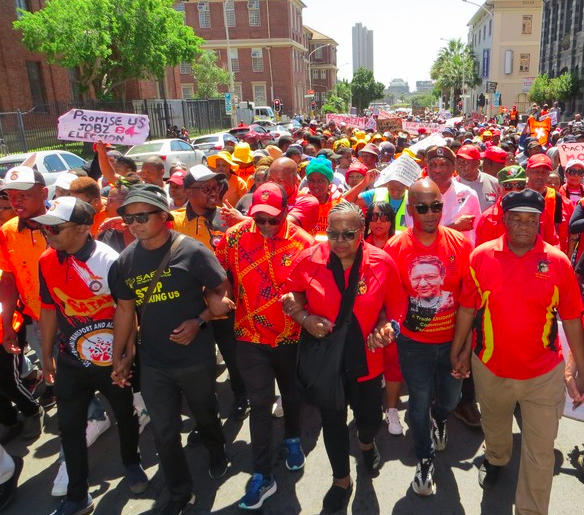Union and civic organisation members marched to Parliament in Cape Town on Wednesday ahead of Finance Minister Enoch Godongwana’s mid-term budget policy statement. Photo: Vincent Lali
By Vincent Lali and GroundUp Staff
Hundreds of people from civic organisations and unions marched to Parliament in Cape Town on Wednesday ahead of Minister of Finance Enoch Godongwana’s Mid-Term Budget Policy Statement (MTBPS).
Many of the protesters sang struggle songs and held up posters which read: “Budget cuts kill education,” and “Create more permanent jobs’” as they walked through busy city streets.
Malvern De Bruyn, Western Cape general secretary of COSATU, said: “A worker spends up to 40% of their wages on petrol per month. We want the government to regulate fuel prices so that workers can have money for food.” Bus and taxi fares had also become unaffordable for many of the lower paid workers, he added.
COSATU’s Solly Petoe said the union wanted the government to avoid cutting teacher posts. The Western Cape Education Department has announced that more than 2,400 teacher posts would be cut because of a lack of funds.
The group handed a memo to an official from the National Treasury. It called on Godongwana to “reduce the prices of basic commodities, strengthen crime prevention initiatives, and amplify crime prevention measures”. The marchers also demanded funding to fill vacancies in schools, hospitals and clinics, and the strengthening of “social safety nets to support vulnerable populations”.
Main takeaways from the budget
Godongwana warned that “difficult trade-offs” would have to be made because of lower-than-expected revenue collections.
He said that South Africa’s debt had risen too fast and “is too high”.
He said debt was unsustainable because repayments and interest had become the largest component of government spending. “Debt-service costs will reach R389- billion in the current financial year. Put differently, this means for every one rand of revenue that government raises this year, 22c of this is paid in debt-service costs.”
“To deal with this problem, we have taken difficult steps to reduce the budget deficit,” he said, and for the first time in 15 years the government had achieved a budget surplus. This would make it possible to stabilise and then reduce the country’s debt, so that debt service costs would begin to decline over the next few years.
Godongwana warned that tax collections for 2024/5 would be R22-billion lower than what had been estimated in February.
“In the absence of faster growth and in the face of external risks, tax revenue will remain under pressure, forcing us to make difficult decisions on where to spend,” he said. “Difficult trade-offs” would have to be made.
But he promised, in spite of weaker revenue, “our most immediate spending pressures will be addressed”, including R2.7-billion announced at the time of the main budget, mainly for the Covid social relief of distress grant, and unforeseen spending of R2.1-billion, mainly for disaster relief.
He said additional funding would be given to Parliament, the Office of the Chief Justice, SARS and the Independent Electoral Commission to allow local government elections to run smoothly.
On social grants, he promised that applications and payments would be digitised and simplified.
No more money for teacher posts
Godongwana did not mention the issue of teacher posts. There has been no increase in the provincial equitable share for 2024/25 and no increase in funds allocated to absorb cost-of-living adjustments for health or education. This means the provinces have no choice but to keep their education budgets the same for this year, unless they decide to reallocate funds internally.
Follow African Insider on Facebook, Twitter and Instagram
Picture: GroundUp
For more African news, visit Africaninsider.com


